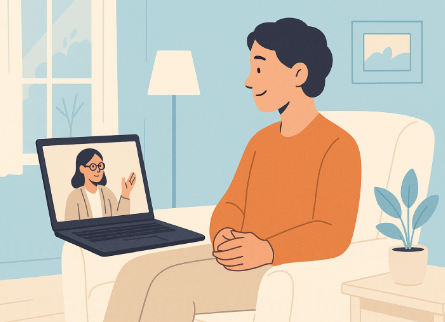Online Anxiety Therapist Services Improving Mental Health Access

An online anxiety therapist provides mental health support through virtual sessions, making therapy more accessible and convenient for those struggling with anxiety. This option removes common barriers like travel time, scheduling conflicts, and the stigma sometimes associated with in-person therapy.
Online anxiety therapy connects individuals with licensed professionals who can offer evidence-based treatments such as cognitive behavioral therapy (CBT), tailored to reduce anxiety symptoms effectively. Many platforms accept insurance and offer flexible pricing, making mental health care more affordable and easy to access.
With a variety of programs available—from personalized coaching to psychiatric support—online therapy accommodates different needs and preferences. This makes it a practical solution for anyone seeking help with anxiety without the constraints of traditional office visits.
What Is an Online Anxiety Therapist?
An online anxiety therapist provides mental health support through digital platforms, focusing on treating anxiety-related conditions. Their approach often includes evidence-based methods like cognitive behavioral therapy (CBT) to help clients manage symptoms and improve daily functioning.
These therapists deliver care remotely, making treatment accessible and flexible. They are licensed professionals trained to identify and address anxiety disorders using secure video, phone, or chat sessions tailored to individual needs.
Benefits of Online Anxiety Therapy
Online anxiety therapy offers convenience by eliminating travel and allowing sessions from any location with internet access. This flexibility supports clients with busy schedules or limited mobility.
It can reduce the stigma of visiting a therapist’s office, encouraging more people to seek help. The platforms used often provide continuous access to resources like self-guided modules and progress tracking.
Costs tend to be competitive, and many online therapists accept insurance coverage or offer sliding scale fees. The variety of communication methods—video, phone, or text—helps cater to different comfort levels.
How Online Therapy Sessions Work
Sessions usually start with an initial assessment to understand the client’s anxiety triggers and history. Then, therapists design a customized treatment plan, often incorporating CBT techniques to challenge negative thought patterns.
Therapy takes place via secure video calls or messaging apps. Sessions generally last 30-60 minutes and occur weekly or as agreed upon. Many platforms offer interactive exercises and homework assignments between sessions.
Clients can track their progress through digital tools built into the therapy platform. This structure supports ongoing communication and adaptation of therapy based on individual response.
Credentials and Qualifications of Online Therapists
Licensed online anxiety therapists hold credentials like Licensed Professional Counselor (LPC), Licensed Clinical Social Worker (LCSW), or Licensed Psychologist (PhD or PsyD). These qualifications ensure they meet state regulations and professional standards.
They are trained in evidence-based anxiety treatments, including CBT and sometimes medication management in collaboration with psychiatrists. Many platforms verify licenses and provide therapist profiles for clients to review experience and specialties.
Ethical and privacy standards govern online therapy just as in-person care, requiring secure data handling and confidentiality. Choosing a licensed therapist with specific anxiety treatment experience is essential for effective care.
How to Choose the Right Online Anxiety Therapist
Selecting the right online anxiety therapist requires attention to experience, security measures, and platform options. These factors ensure effective treatment, confidentiality, and a comfortable therapy experience tailored to individual needs.
Evaluating Therapist Experience With Anxiety Disorders
It is essential to verify a therapist’s specific expertise in treating anxiety disorders, such as generalized anxiety, panic attacks, or social anxiety. Look for credentials, relevant certifications, and years of experience focused on anxiety treatment.
Reviews and therapist profiles often disclose their treatment approaches, like cognitive-behavioral therapy (CBT) or exposure therapy, which are effective for anxiety. A therapist’s ability to customize strategies based on client symptoms significantly impacts therapy outcomes.
Patients should also consider whether the therapist offers ongoing assessments and adjusts treatment as anxiety symptoms evolve.
Read also: How Cape Town and Durban Rehab Centers Support Mental Health Recovery
Security and Privacy in Online Therapy
Confidentiality is crucial in online therapy. Look for platforms that use end-to-end encryption and comply with healthcare privacy regulations such as HIPAA in the U.S. or GDPR in Europe.
Therapists should conduct sessions through secure video or messaging systems, ensuring no unauthorized access to personal information. Many reputable services provide clear privacy policies outlining data protection and limits of confidentiality.
Clients should confirm how their information is stored, for how long, and whether it can be shared with third parties. A trustworthy online therapist prioritizes client data security at every stage.
Comparing Online Therapy Platforms
Choosing a platform involves assessing affordability, accessibility, and quality of care. Some platforms offer subscription plans, while others charge per session. Transparent pricing helps avoid unexpected costs.
Check if platforms have a diverse pool of licensed therapists specializing in anxiety. Features like session flexibility, communication options (text, video, phone), and therapist matching tools enhance user experience.
Ratings from independent reviews and expert evaluations can guide decisions. Options that offer integrated mental health support, including psychiatry or medication management, may be beneficial depending on patient needs.




